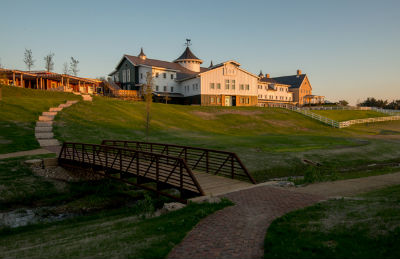Science and Technology Centers: Integrative Partnerships
The Science and Technology Centers (STC):
Integrative Partnerships program supports exceptionally innovative, complex research and education projects that require large-scale, long-term awards.
STCs focus on creating new scientific paradigms, establishing entirely new scientific disciplines and developing transformative technologies which have the potential for broad scientific or societal impact.
STCs conduct world-class research through partnerships amonginstitutions of higher education, national laboratories, industrial organizations, other public or private entities, and via international collaborations, as appropriate.
They provide a means to undertake potentially groundbreaking investigations at the interfaces of disciplines and/or highly innovative approaches within disciplines.
STCs may involve any area of science and engineering that NSF supports.
STC investments support the NSF vision of creating and exploiting new concepts in science and engineering and providing global leadership in research and education.
Centers provide a rich environment for encouraging future scientists, engineers, and educators to take risks in pursuing discoveries and new knowledge.
STCs foster excellence in education by integrating education and research, and by creating bonds between learning and inquiry so that discovery and creativity fully support the learning process.
NSF expects STCs to demonstrate leadership in the involvement of groups traditionally underrepresented in science and engineering at all levels (faculty, students, and postdoctoral researchers) within the Center.
Centers use either proven or innovative mechanisms to address issues such as recruitment, retention and mentorship of participants from underrepresented groups.
Centers must undertake activities that facilitate knowledge transfer, i.e., the exchange of scientific and technical information with the objective of disseminating and utilizing knowledge broadly in multiple sectors.
Examples of knowledge transfer include technology transfer, providing key information to public policy-makers, or dissemination of knowledge from one field of science to another.
Integrative Partnerships program supports exceptionally innovative, complex research and education projects that require large-scale, long-term awards.
STCs focus on creating new scientific paradigms, establishing entirely new scientific disciplines and developing transformative technologies which have the potential for broad scientific or societal impact.
STCs conduct world-class research through partnerships amonginstitutions of higher education, national laboratories, industrial organizations, other public or private entities, and via international collaborations, as appropriate.
They provide a means to undertake potentially groundbreaking investigations at the interfaces of disciplines and/or highly innovative approaches within disciplines.
STCs may involve any area of science and engineering that NSF supports.
STC investments support the NSF vision of creating and exploiting new concepts in science and engineering and providing global leadership in research and education.
Centers provide a rich environment for encouraging future scientists, engineers, and educators to take risks in pursuing discoveries and new knowledge.
STCs foster excellence in education by integrating education and research, and by creating bonds between learning and inquiry so that discovery and creativity fully support the learning process.
NSF expects STCs to demonstrate leadership in the involvement of groups traditionally underrepresented in science and engineering at all levels (faculty, students, and postdoctoral researchers) within the Center.
Centers use either proven or innovative mechanisms to address issues such as recruitment, retention and mentorship of participants from underrepresented groups.
Centers must undertake activities that facilitate knowledge transfer, i.e., the exchange of scientific and technical information with the objective of disseminating and utilizing knowledge broadly in multiple sectors.
Examples of knowledge transfer include technology transfer, providing key information to public policy-makers, or dissemination of knowledge from one field of science to another.
Agency: National Science Foundation
Office: National Science Foundation
Estimated Funding: $25,000,000
Office: National Science Foundation
Estimated Funding: $25,000,000
Obtain Full Opportunity Text:
NSF Publication 19-567
Additional Information of Eligibility:
*Who May Submit Proposals: Proposals may only be submitted by the following: - Preliminary proposals and invited full proposals may only be submitted by domestic (United States)institutions of higher education that are located in the United States, its territories or possessions, and have doctoral degree-granting research and education programs in any area of research supported by NSF.
The lead institution is expected to develop partnerships or arrangements with other universities, colleges, or other institutions, such as national laboratories, research museums, private sector research laboratories, state and local government laboratories, and international organizations as appropriate toenable the Center to attain its strategic goals.
*Who May Serve as PI: The PI must be a full-timefaculty member at aninstitution of higher education and have an established record of leading research teams.
Full Opportunity Web Address:
http://www.nsf.gov/publications/pub_summ.jsp?ods_key=nsf19567
Contact:
Agency Email Description:
If you have any problems linking to this funding announcement, please contact
Agency Email:
Date Posted:
2019-03-15
Application Due Date:
Archive Date:
2020-02-26
Social Entrepreneurship
Spotlight
Calgary Social Enterprise Offers High-Tech Services by People with Autism

Meticulon, a project of Autism Calgary Association in partnership with the federal government and the Sinneave Family Foundation, operates as a social enterprise that renders high-tech services provided by people with autism, leveraging their natural abilities at requiring attention to detail, repetition, and sequencing.

